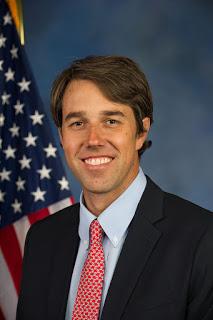 Former Democratic Rep. Beto O'Rourke (pictured) has not yet announced whether he will run for president or not, but he did recently stake out an important policy position -- one that should appeal to most Democrats.
Former Democratic Rep. Beto O'Rourke (pictured) has not yet announced whether he will run for president or not, but he did recently stake out an important policy position -- one that should appeal to most Democrats.O'Rourke says our criminal justice system is unfair. the has offered several suggestions on how to reform that system -- including ending the federal prohibition on marijuana.
Here is the e-mail he sent outlining the reforms he wants. They make a lot of sense to me.
It’s unacceptable that our country has the world’s largest prison population, disproportionately comprised of people of color. One-third of that prison population is there for nonviolent drug crimes, and though we know that people of all races use illegal drugs at roughly the same rate, some are being locked away for it more than others. Many have called this part of the New Jim Crow, and for good reason. One in four black children have had a parent in the criminal justice system, compared to just four percent of white children. That rate is nearly two times what it was in the 1980s. And it begins with a school-to-prison pipeline that starts as early as kindergarten, where a black child is four to five times as likely to be suspended or expelled as a white child. I am more convinced than ever that we can and must build a criminal justice system that is more fair and that urgently puts our country closer to the words written above the highest court in our land: equal justice under law. This is how I propose we do it. First, we need to end the failed war on drugs that has long been a war on people, waged on some people over other people. Who is going to be the last man — more likely than not a black man — to languish behind bars for possessing or using marijuana when it is legal in some form in more than half of the states in this country? We should end the federal prohibition on marijuana and expunge the records of those who were locked away for possessing it, ensuring that they can get work, finish their education, contribute to the greatness of this country. Second, we end the broken system of cash bail that punishes people for being poor. This is a tactic that wastes resources on incarcerating those who are not a threat to anyone, not a flight risk, not likely to be repeat offenders. In the Harris County Jail alone, it’s estimated that 500 to 600 of the inmates at any given time fit this description. And that's not an outlier -- 75% of people in Texas jails have not been convicted of any crime but many can't afford bail. Third, we should eliminate private, for-profit prisons from our justice system to ensure we're always putting people before profits. Locking someone up is a power that should be reserved for our government -- the people, not outsourced to corporations that have the perverse incentive of getting more men and women behind bars so that there are more profits for their shareholders. Fourth, we must stop using mandatory minimum sentencing for non-violent drug offenses — a practice that costs taxpayers dearly and destroys lives in the process by locking up people who could safely re-enter society. And we replace this practice with policies that begin treating addiction like the public health concern it is. Finally, we should provide meaningful reentry to help people who have been incarcerated resume their lives and contribute to their full potential. That starts with strong rehabilitation services, counseling and access to preventative health care. It continues by banning the box on job applications so those formerly incarcerated can work and pay taxes, returning drivers licenses so they can get to that place of employment, allowing them to apply for loans that can unlock skills trainings, and ensuring their constitutional right to participate in civic life by voting is protected. As a congressman, I worked with colleagues across the aisle to introduce legislation that aims to do these things, to achieve real reforms. I know we can get this done but only if we all work towards these goals together. At the end of the day, this is about ensuring that every single one of us can live to our full potential and contribute to our maximum capacity. Giving low-level offenders a second chance no matter the color of their skin or the economic status they hold can create opportunity for all of us. It will help build a future that is more just, more fair, and more prosperous for every single person in this state and this country.

